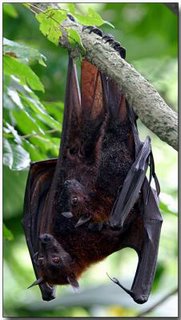Fruit Bats May Harbour Deadly Ebola
 Catherine Brahic
Catherine Brahic
SciDev.Net
________
Researchers have found strong evidence that fruit bats are responsible for outbreaks of the deadly Ebola virus in people.
Their findings — the latest in a decades-long effort to learn where the Ebola virus lives when it is not causing deadly disease outbreaks — are published in Nature.
Ebola causes a fever that kills 50 to 90 per cent of infected people. Since the first recorded human outbreak in 1976, researchers have tried unsuccessfully to find the virus's 'reservoirs' — one or more species it can survive in without causing symptoms.
Identifying these reservoirs could help scientists devise ways to prevent the virus from infecting people.
To find them, a team led by Eric Leroy of the International Centre for Medical Research in Franceville, Gabon, set traps near where Ebola had killed gorillas and chimpanzees in the Democratic Republic of Congo and Gabon. Previous research has shown that captive bats infected with Ebola do not show symptoms.
Bats are also known to be reservoirs for several other viruses including rabies, Nipah, Hendra and SARS.Andy Dobson of Princeton University, United States, says understanding why bats are so good at withstanding viral infections could help scientists control viruses in people and livestock.
Dobson suggests studying how the DNA of bats and other mammals affects their ability to fight disease. "We need to know whether and why [this is different] in bats as it could lead to great breakthroughs in treatments for viral disease of humans," he told SciDev.Net.
 Catherine Brahic
Catherine BrahicSciDev.Net
________
Researchers have found strong evidence that fruit bats are responsible for outbreaks of the deadly Ebola virus in people.
Their findings — the latest in a decades-long effort to learn where the Ebola virus lives when it is not causing deadly disease outbreaks — are published in Nature.
Ebola causes a fever that kills 50 to 90 per cent of infected people. Since the first recorded human outbreak in 1976, researchers have tried unsuccessfully to find the virus's 'reservoirs' — one or more species it can survive in without causing symptoms.
Identifying these reservoirs could help scientists devise ways to prevent the virus from infecting people.
To find them, a team led by Eric Leroy of the International Centre for Medical Research in Franceville, Gabon, set traps near where Ebola had killed gorillas and chimpanzees in the Democratic Republic of Congo and Gabon. Previous research has shown that captive bats infected with Ebola do not show symptoms.
Bats are also known to be reservoirs for several other viruses including rabies, Nipah, Hendra and SARS.Andy Dobson of Princeton University, United States, says understanding why bats are so good at withstanding viral infections could help scientists control viruses in people and livestock.
Dobson suggests studying how the DNA of bats and other mammals affects their ability to fight disease. "We need to know whether and why [this is different] in bats as it could lead to great breakthroughs in treatments for viral disease of humans," he told SciDev.Net.









